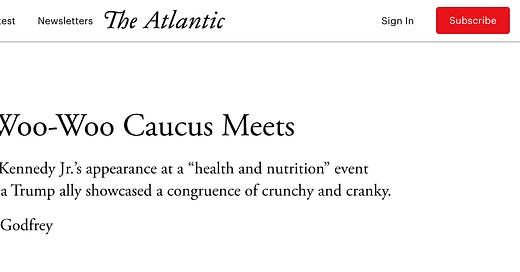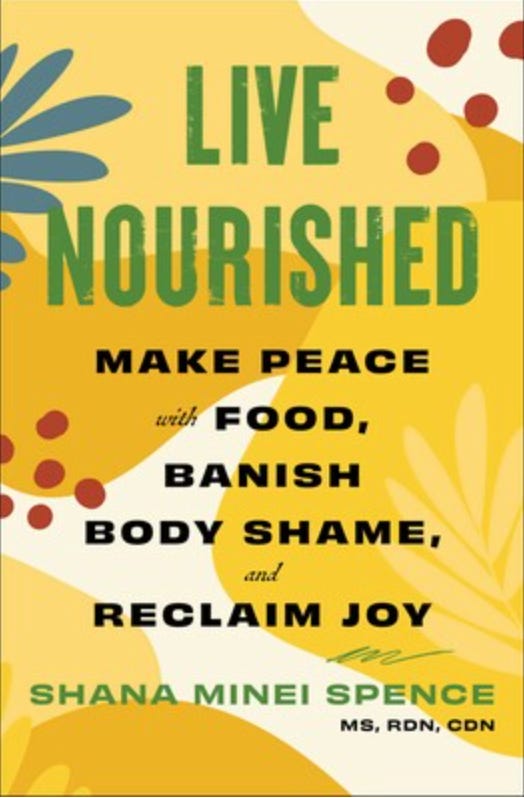Woo woo wellness goes to Washington
I think about how the nutrition roundtable meeting that was held on Monday, probably made Rev. Graham and Dr. Kellogg smile. Cleanliness and purity are the goal, but for which demographic exactly?
On Monday, September 23rd, a roundtable discussion titled American Health and Nutrition: A Second Opinion was held. It featured a panel of experts conspirators to, and I quote, “provide a foundational and historical understanding of the changes that have occurred over the last century within agriculture, food processing, and healthcare industries which impact the current state of national health.”
You don’t need credentials, you just need a platform
I bet when you first heard of a roundtable discussing health and nutrition, you pictured a roundtable of dietitians, doctors, and other prominent health professionals sitting and discussing the factors that contribute to health and nutrition intake. See, unfortunately, that would make too much sense. It was anything but. I finally got around to watching the roundtable myself and could only get through about an hour before my brain fried out from listening to nonsense, and I stuck with the highlights. The conversation was led by U.S. Sen. Ron Johnson (R-Wis.) along with Robert F. Kennedy Jr., Vani Hari, a.k.a. the “Food Babe” influencer, The Biggest Loser’s Jillian Michaels, conservative psychologist Jordan B. Peterson, his daughter Mikhaila Peterson Fuller, 18-year-old Grace Price, a self-identified citizen scientist, and many more. I mean, the red flags are red flagging here.
All this to say, it should be no surprise to anyone that many of these folks took issue with “Big Food” and “Big Pharma” in their role of “poisoning” the American people. So we shouldn’t trust large corporations, but we should trust people pushing their own line of products, pills, and potions? Sure, sounds great. It also shouldn't be a surprise that many of these folks were the same ones pushing anti-vaccine rhetoric. After all, if you are healthy and fit, why would you need a vaccine? Why should you take something that “Big Pharma” is going to profit off of? Again, as I mentioned above, the red flags are red flagging.
I thought about all the various directions I could take writing a newsletter about this, but one thing that came to mind was the history behind “clean eating,” and how the founders were eugenicists, and how we now have come full circle with alt-right, conservative conspirators holding roundtable discussions about nutrition. One thing we love to do as a nation is have history repeat itself. After all, we are a nation that loves to be healthy. We love to talk about health. We love to proclaim that we eat so healthy and prove to others that our lifestyles are so healthy.
However, we also have this idea that health equates to a moral standard. And when we talk about morality, we also have to talk about healthism. If you have been reading my work for a while now, you know that I talk about healthism quite a bit, and it can be defined as “situating the problem of health and disease at the level of the individual. Solutions are formulated at that level as well.” If you want a more in-depth conversation on this topic, I will shamelessly add that my new book, Live Nourished, provides just this.
So the roundtable of experts conspirators may have voiced concerns over the food systems and the health of the American public, but being vocal about not needing a vaccine and being part of a political party to vote against policies that would improve the quality of life for everyone, cancels those concerns out. What I viewed when I watched it were 13 white people, yelling (yes, as the discussion went on, there was yelling into the microphones) about poisonous food (aka breakfast cereals) and “Big Pharma” and the food pyramid (which has not been used since 2011), but not one of them talked about the social determinants of health or socioeconomic factors or the bills that were voted against by the conservative party in order to improve said health. Shocking, I know.
But as I mentioned before, history loves repeating itself, and everything has roots stemming from something. Healthism, elitism, and ableism are now under the guise of wellness, and you will see these posts under “clean eating” and such. Yes, the promotion of purity and cleanliness of body, food, and lifestyle is nothing new. So how did it begin?
Rev. Graham and Dr. Kellogg were at the roundtable in spirit
From now on, every single time you eat a s’more, think of Reverend Sylvester Graham (1794 – 1851). Sounds weird, right? Well, what’s weirder is the fact he invented the Graham Diet in order to curb sexual desires. Physical lust, particularly for oneself (aka masturbation), Graham believed, caused mental health issues and blindness. From this belief came the invention of the graham cracker. Graham, a former farmhand and teacher turned Presbyterian minister, believed that adhering to a vegetarian diet and abstaining from sugars, spices, and foods made with overly processed flour and chemical additives would enforce purity of thoughts and acts and curb the sexual appetite. Pure foods. Whole foods. Don’t worry, the delicious crackers that we eat today are vastly different from the original formula, which lacked sweeteners such as sugar and honey. Today’s graham cracker formulas incorporate ingredients such as molasses, brown sugar, kosher salt, and ground cinnamon. Thank goodness. Think about all the posts on avoiding sugar, and the more hyper-palatable a food is, the worse it is for you. The rhetoric might not be leaving out curbing sexual appetite, but it still is quite similar. Let’s look at another example.
I take my cornflakes with sliced banana and a drizzle of honey. This would horrify Dr. John Harvey Kellogg (1852 – 1943). Kellogg can be described as many things: a leader of the eugenics and racial segregation movement (stating it was the only way to save society from disaster), a physician, nutritionist, inventor, and medical missionary. Another believer in the evil of sexual acts, he believed that masturbation led to poor digestion, memory loss, impaired vision, heart disease, epilepsy, and insanity. Kellogg advocated against eating "spices, pepper, ginger, mustard, cinnamon, cloves, essences, all condiments, salt, pickles, fish, fowl, oysters, eggs, and milk. Stimulating drinks should be abstained from with still greater strictness. Wine, beer, tea, and coffee should be taken under no circumstances." In order to help his followers and patients with bland and unstimulating diets, Kellogg and his brother invented the breakfast variation of cornflakes in 1878. A leader in eugenics who was against the use of spices amongst other foods, again, the similarities to wellness culture are uncanny. Kellogg dedicated the last 30 years of his life to promoting eugenics and segregation and he was a major leader in progressive health reform, particularly in the second phase of the “clean living movement.” Lovely.
I find the non-use of spices particularly interesting because I hear folks now say not to use them because they make food hyper-palatable. I mean, no shit Sherlock, we want our food to taste good. The history of spices is fascinating, in addition to the masturbation factor mentioned above. I wrote about it in my book as well. Yes, there is another shameless plug here. But as a recap:
In medieval Europe, the wealthy would use spices such as saffron, cinnamon, cloves and ginger. Because of this, spices were expensive, which meant that only the upper class could afford them. However, as Europeans began colonizing parts of India and the Americas, spices became abundant. Krishnendu Ray, an associate professor of food studies at New York University, says, "What used to be expensive and exclusive became common." Hint hint. I always ask the question, is something better, or is it just not as accessible and more expensive that makes it better?
So what happened because of this? Spices were no longer a status symbol for Europe's wealthiest families since even the middle classes could afford it. "So the elite recoiled from the increasing popularity of spices," Ray says. "They moved on to an aesthetic theory of taste. Rather than infusing food with spice, they said things should taste like themselves. Meat should taste like meat, and anything you add only serves to intensify the existing flavors." Sound familiar?
How about a roundtable on the declining quality of life contributing to chronic stress and illnesses?
You cannot discuss health without discussing the social determinants of health. You cannot discuss concerns about health while also being an anti-vaxxer. You cannot discuss health while also voting against every bill that the opposing political party places in front of you that would better the quality of life for everyone in the country because you have an ego. Let’s just be super clear with a few things: Can there be a concern with food and nutrition? Yes, of course. Is everyone who posts about the concept of eating healthy doing something wrong? No, definitely not. I believe that you should eat how you wish because I believe in body autonomy. I work in the health field, so I don’t think discussing health is inherently wrong or evil.
What I do take immense issue with is the concept that health is a moral determinant of how we treat people. We associate it with a moral virtue as well. This obsession that we as a society have with health is, in a way, concerning, especially if you learn the history behind where much of this rhetoric comes from. There is nothing wrong with having goals or wanting to know what’s in your food. However, what is the silver lining of when this becomes dangerous? I don’t have an exact answer to this, but I do want to leave you with the following food for thought questions:
At what point do we acknowledge that it's not the healthiest of lifestyles if we are restricting our food to the point of constantly thinking of food and then telling ourselves we are obsessed or addicted?
At what point do we acknowledge that it's not the healthiest of lifestyles if we disengage and withdraw from social events and connections because we are worried about being around food and not being able to control ourselves?
At what point do we acknowledge that it's not the healthiest of lifestyles if we are hyper-fixated on physical body changes only that come at the expense of our mental, physical, and emotional health?
Food and what works for people will also always be nuanced and individual. Food is representative of so many things aside from its nutrients. It represents a social aspect, culture, community, traditions, experiences, and joy. This tends to get lost in translation in the media, so I will continue to broadcast this myself. Joy is a nutrient. So cheers to s’mores!

Like what you read? Imagine a whole book to read that goes into more detail! Yes, that’s why I wrote one. Live Nourished: Make Peace with Food, Banish Body Shame, and Reclaim Joy is available now wherever books are sold.








this is so informative and entertaining despite the grim reality,, and also, i will now see each graham cracker crust that i put below another one of my scrumptious cheesecakes as a historical revenge and (mis)appropriation that puts the graham cracker right into its place right along lots of indulgent joyful other ingredients
I always think I have seen all the things that can make my jaw drop, but nope, there's always more. The conspiracy/wellness/spirituality/purity culture pipeline is just...oooof. Doppleganger and Conspirituality really brought all these ideas together for me in probably the most concrete way recently (before I found you!). Unfortunately, as I learn more, the more frustrated and sad I am that here we are still just walking around every day just desperately trying to not fall into yet another culty trap related to something as basic as feeding ourselves. I want it to stooooop.